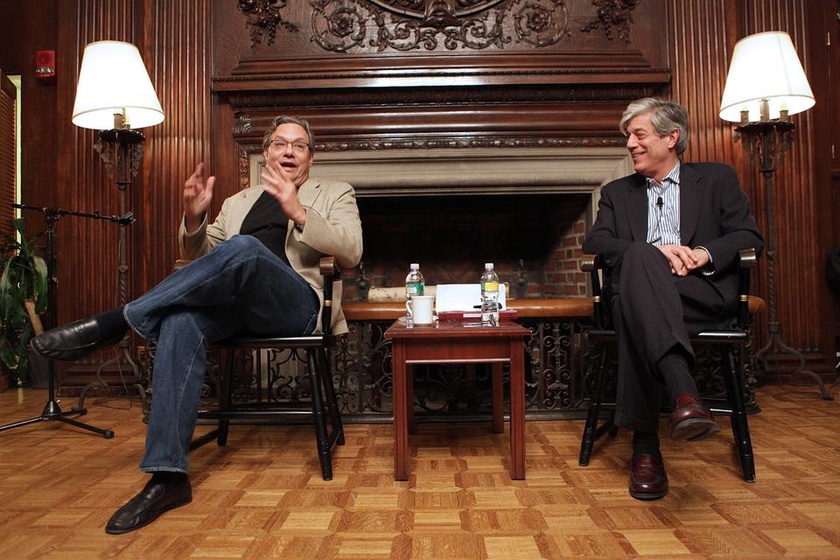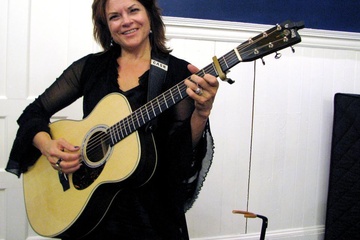Kirkland’s Resident Scholar, Peter V. Emerson, the mastermind behind “Conversations with Kirkland,” is perhaps the only individual on Harvard’s campus lucky enough to meet Rosanne Cash at the Albuquerque airport, bump into Lewis Black on a train to Washington, chat up Sam Waterston at an event in New York, and convince the President of Zambia to take a Boston Duck Tour. For the past seven years, Emerson has combined similarly serendipitous celebrity encounters with his natural charm and brought a wide array of interesting and diverse speakers to the Harvard community.
The intimate and informal setting that Emerson’s “Conversations with Kirkland” seeks to maintain distinguishes the events from many similar Harvard happenings. “Students get more engaged. They feel like they have some kind of impact on the event, rather than just listening to someone talking to them,” explains Loren Amor ’10, a former Crimson sports chair who became involved with the series during his sophomore year. “They are able to steer the discussion in a way that is interesting to them and the students get to hear about issues they care about.”
AN IDEA ENTREPRENEUR
Emerson, initially a college dropout, received his bachelor’s degree from New York University in 1995 after attending night classes. He came to Harvard in 1999, working as a teaching fellow for world-renowned child psychologist Robert Coles before entering the Kennedy School of Government. During his time at the Kennedy School, Emerson’s passion for developing policy ideas precipitated a realization.
“I’m not an entrepreneur of business. I’m not an entrepreneur of anything, except I think up ideas,” Emerson says. “Nine out of ten are crazy, but the one has some merit.”
One of his first projects to strike gold was the creation of a college environment in which seeking help for addiction problems was transformed into a positive and incentivized experience. Emerson took his idea to Howard J. Shaffer, the director of the Division on Addictions at the Harvard Medical School, who chose him as the division’s associate for public policy. With this new job in hand, Emerson decided to stay in Cambridge. Yet beyond Cambridge itself, Emerson had fallen in love with the Harvard atmosphere. So,instead of moving into an apartment or house off-campus, he spoke with the House Masters of Kirkland and convinced them that his connections could be useful. The House Masters, in return, appointed him to the position of Resident Scholar, giving Emerson a place to live within the Harvard niche.
At that point, Emerson recalls, he took time to reflect on how he could give back to the Harvard community.
“I was trying to think, ‘What could I do based on my experience and who I know to give to the student community?’” Emerson says. “I came up with this idea—’Conversations with Kirkland’—which would bring in distinguished and accomplished people from politics, arts, the media, and business for students to have truly an informal conversation.”
CHALLENGING THE CELEBS
More than simply draw luminaries to campus, Emerson teaches students how to engage with the guests.
“By his example, Peter showed us how to do so naturally and graciously—a lesson we carry with us for the rest of our lives,” says Bolek Z. Kabala ’03.
According to Emerson, the first speaker—former Senator Gary W. Hart—was a hit. What was most amazing, Emerson asserts, may not have been the effect that Hart had on the students, but the effect that the students had on the Senator. “In the course of his conversation, he suggested something that he had decided and a student challenged him—said, ‘Senator, I don’t think that is right.’” Emerson recalls. “He paused and said, ‘Let me think about it,’ and I rode with him over to the Kennedy Library and in the car he said, ‘You know, that student is right. I need to change my mind.’”
“I knew this was a great thing because I thought if a student here can change Senator Hart’s mind, we’ve got something.’”
Hardball’s Chris J. Matthews, a close friend of Emerson’s, agrees that the value in speaking with Harvard students is especially apparent within the context of Emerson’s “Coversations with Kirkland.”
“The great thing about talking to students is that they are still focused on the biggest possible questions and the widest perspectives because they haven’t taken themselves professionally to a niche yet,” Matthews says. “They are wide open as to what they are interested in. If you get into a business crowd, you might find yourself with business questions, but I don’t find that at Harvard.”
Before making an appearance, each speaker in the “Conversations with Kirkland” series is asked about his or her interests; Emerson arranges a meeting with a Harvard faculty member in that field as a partial compensation for the speaker’s time. Rosanne Cash, Johnny Cash’s daughter, spoke fondly of the experience of meeting her favorite all-star professor. “I had a private meeting with Dr. Lisa Randall and asked her all the questions about theoretical physics I have been storing up for years,” she says.
Which guests remain on Emerson’s wish list? Lady Gaga, Elvis Costello, Sting, and Triumph the Insult Comic Dog. Before disappointment at Gaga’s absence takes hold, however, the following are possibilities for next year’s series of discussions: Lorne Michaels of “Saturday Night Live” and “30 Rock,” Craig Ferguson of “The Late Late Show,” and Gene Simmons of KISS have each been invited.
Reflecting on his successes as an event planner, Emerson emphasizes his theory that sending an invitation is almost always the first step. Sometimes the speaker will refuse, but Emerson explains the powerful incentives. “People have a desire to come here—partly because of the brand, partly because of the reputation, and partly because of the students.”



